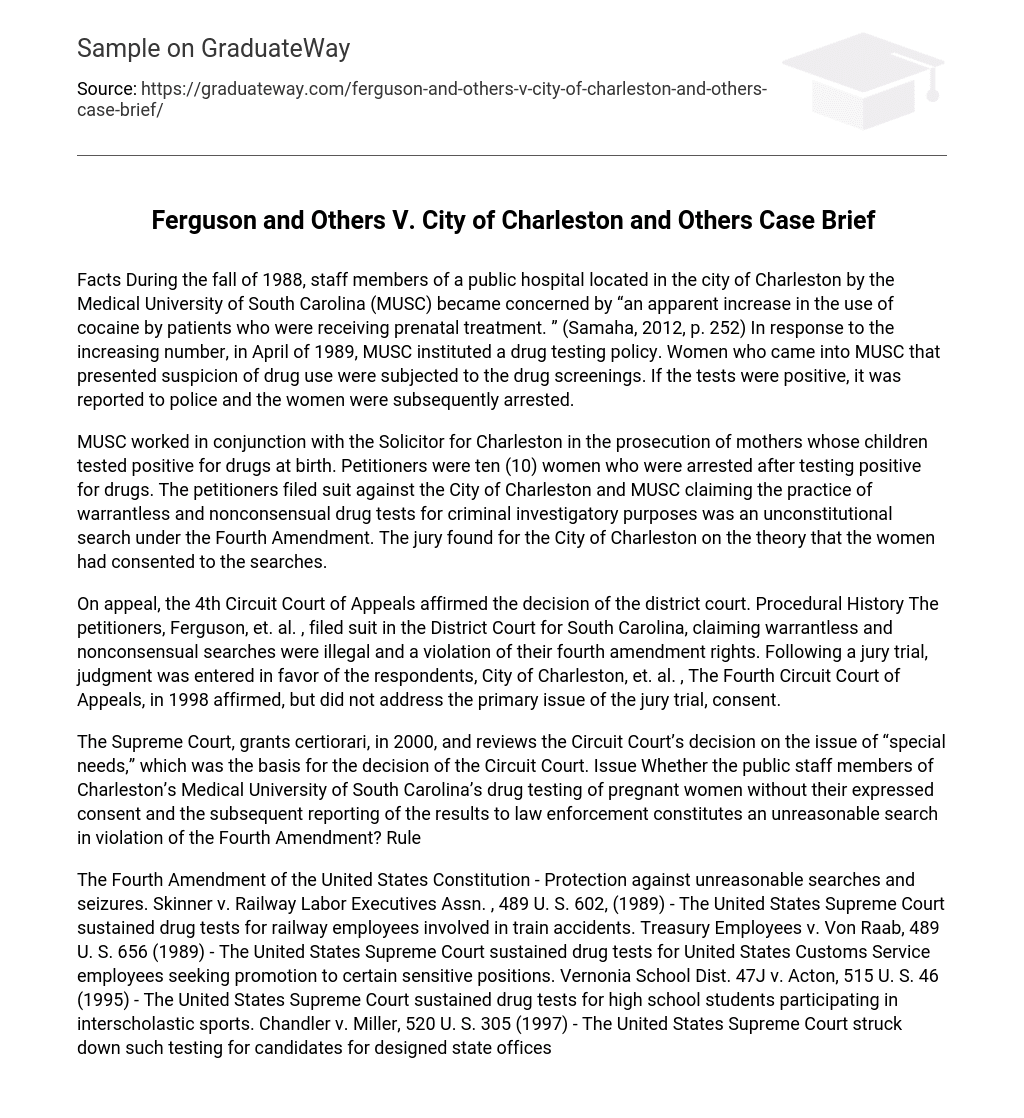Facts During the fall of 1988, staff members of a public hospital located in the city of Charleston by the Medical University of South Carolina (MUSC) became concerned by “an apparent increase in the use of cocaine by patients who were receiving prenatal treatment. ” (Samaha, 2012, p. 252) In response to the increasing number, in April of 1989, MUSC instituted a drug testing policy. Women who came into MUSC that presented suspicion of drug use were subjected to the drug screenings. If the tests were positive, it was reported to police and the women were subsequently arrested.
MUSC worked in conjunction with the Solicitor for Charleston in the prosecution of mothers whose children tested positive for drugs at birth. Petitioners were ten (10) women who were arrested after testing positive for drugs. The petitioners filed suit against the City of Charleston and MUSC claiming the practice of warrantless and nonconsensual drug tests for criminal investigatory purposes was an unconstitutional search under the Fourth Amendment. The jury found for the City of Charleston on the theory that the women had consented to the searches.
On appeal, the 4th Circuit Court of Appeals affirmed the decision of the district court. Procedural History The petitioners, Ferguson, et. al. , filed suit in the District Court for South Carolina, claiming warrantless and nonconsensual searches were illegal and a violation of their fourth amendment rights. Following a jury trial, judgment was entered in favor of the respondents, City of Charleston, et. al. , The Fourth Circuit Court of Appeals, in 1998 affirmed, but did not address the primary issue of the jury trial, consent.
The Supreme Court, grants certiorari, in 2000, and reviews the Circuit Court’s decision on the issue of “special needs,” which was the basis for the decision of the Circuit Court. Issue Whether the public staff members of Charleston’s Medical University of South Carolina’s drug testing of pregnant women without their expressed consent and the subsequent reporting of the results to law enforcement constitutes an unreasonable search in violation of the Fourth Amendment? Rule
The Fourth Amendment of the United States Constitution – Protection against unreasonable searches and seizures. Skinner v. Railway Labor Executives Assn. , 489 U. S. 602, (1989) – The United States Supreme Court sustained drug tests for railway employees involved in train accidents. Treasury Employees v. Von Raab, 489 U. S. 656 (1989) – The United States Supreme Court sustained drug tests for United States Customs Service employees seeking promotion to certain sensitive positions. Vernonia School Dist. 47J v. Acton, 515 U. S. 46 (1995) – The United States Supreme Court sustained drug tests for high school students participating in interscholastic sports. Chandler v. Miller, 520 U. S. 305 (1997) – The United States Supreme Court struck down such testing for candidates for designed state offices as unreasonable. Analysis The staff of a public hospital, Medical University of South Carolina (MUSC), was seeking to justify their authority to conduct urine tests of women suspected of drug abuse during pregnancy and to turn those results over to law enforcement without the patients’ knowledge or consent.
In determining if the search was unconstitutional under the protection of the Fourth Amendment, the court considered Skinner v. Railway Labor Executives Assn. , 489 U. S. 602 (1989) where the U. S. Supreme Court sustained the drug tests for the employees who were involved in accidents; Treasury Employees v. Von Raab, 489 U. S. 656 (1989), where the U. S. Supreme Court also sustained the drug test results for employees who were seeking promotions to sensitive positions; Vernonia School Dist. 47J v. Acton, 515 U. S. 646b (1995), where the U. S.
Supreme Court sustained drug testing for high school students participating in athletic activities; and Chandler v. Miller, 520 U. S. 305 (1997), where the U. S. Supreme Court decided a search must ordinarily be based on individualized suspicion of wrongdoing. These cases considered a balancing test that weighed the intrusion of a person’s privacy against the “special needs” that supported the program. The invasion of privacy in this case was far more substantial because there was an obvious misunderstanding regarding the purpose of the tests and the use of the results.
In all of the previous cases the results involved a disqualification from eligibility of a benefit to include employment or the ability to participate in an activity, not the unauthorized dissemination of the actual test results. In each of the prior cases, the critical difference lied in the nature of the special need. The special need was not one connected to the interest of law enforcement. In this case, the policy’s feature from the inception of such was the use of law enforcement to coerce patients into substance abuse treatment.
The main objective of the search was to generate evidence for law enforcement officials. Public employees, identical to other citizens, have the duty to provide law enforcement with evidence of criminal conduct they obtain during the routine treatment of a patient. When this evidence is taken for the specific purpose of incriminating the patient, in order for the search to be valid under the Fourth Amendment, the patients would have to have been fully informed about their constitutional rights, which they were not.
Conclusion The Court found that the threat of criminal prosecution to force pregnant women into drug treatment and the involvement of law enforcement at every stage of the policy did not fit the category of “special needs. ” The Fourth Amendment protects citizens from warrantless, nonconsensual, and suspicious less searches; the policy applies in this case. The judgment of the Court of Appeals was reversed and remanded for further proceedings.





